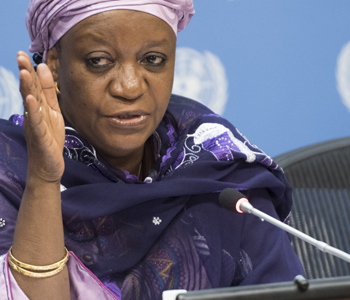
(New York, 16 November 2015) Sexual violence has been a characteristic of the Syrian conflict, and has been perpetrated by most of the belligerent parties as a tactic of war and a tactic of terrorism, United Nations Under-Secretary-General and Special Representative of the Secretary-General, Zainab Hawa Bangura, today told the UN Security Council, calling for political and financial support to strengthen the current response for communities affected by conflict-related sexual violence.
“Our response has to be beyond security and military considerations,” Special Representative Bangura said in her briefing to the Council.
In seven key points, she highlighted a range of interventions that will be required to aid survivors of conflict-related sexual violence, and aim to prevent new attacks:
- Mobilize political commitment, support and resources;
- Ensure that protection and empowerment of women is consistently included as a central consideration in all efforts to prevent violent extremism and countering terrorism;
- Enhance protection, early-warning and risk mitigation;
- Strengthen the support and services to survivors of sexual violence;
- Invest in deepening information, analysis and documentation on sexual violence;
- Pursue accountability through investigation and prosecution of sexual violence crimes;
- Ensure women’s participation in peace and mediation processes and the explicit inclusion of conflict-related sexual violence concerns.
These points form a response strategy that is being developed under the auspices of the Special Representative’s Office, the Team of Experts on the Rule of Law/Sexual Violence in Conflict, and UN Action against Sexual Violence in Conflict (UN Action).
“You political and financial support, and that of other Member States and donors, will be absolutely crucial,” said Special Representative Bangura. “I look forward in the coming weeks and months to share more details about the strategy, and will rely on your steadfast commitment.”
The Special Representative also stressed the importance of community, religious and traditional leaders in breaking the prevailing silence around the issues of conflict-related sexual violence, and in ensuring that survivors are embraced by their families and communities, rather than stigmatized and shunned.



